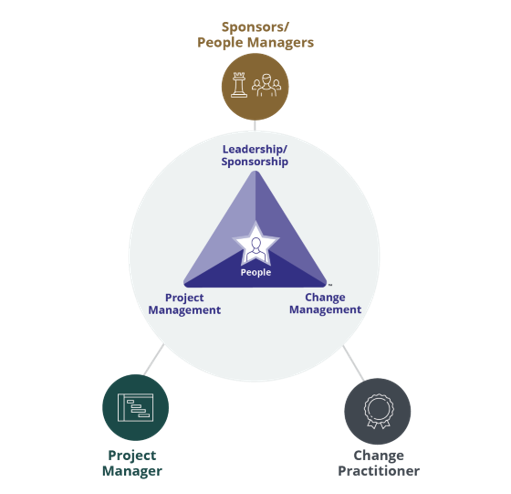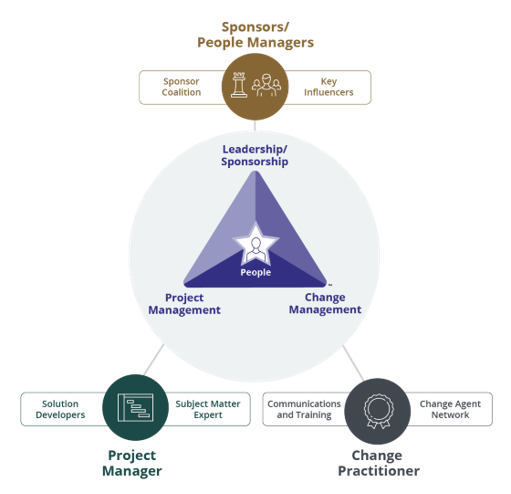Core Roles in Change Management
8 Mins
Updated: October 31, 2025
Published: May 20, 2020

The ultimate goal of change management is to drive organizational results and outcomes by engaging employees and inspiring them to adopt a new way of working.
Whether the change is to a process, system, job role, organizational structure, or all of these, a project or initiative can only be successful if individual employees change their behaviors. This is the essence of change management. And to manage change successfully, all core roles must participate.
A Coordinated System of Support During Change
Much like putting on a play—where actors, directors, costume designers, lighting and sound crews coordinate their unique talents to deliver a single successful outcome—change management requires individuals in key roles to engage with the change and coordinate their efforts in defined ways. From the highest levels of leadership to front-line employees, an entire system of people within the organization must support employees through the transition.
This article examines the core roles in change management:
- Change practitioners
- Sponsors
- People managers
- Project manager
- People (impacted employees)

Role Descriptions and Misconceptions
The table below describes each core role from the perspective of the person or group executing it. These “I-by” statements illustrate what each individual or group might say when they understand their role and are actively engaged in managing change. The table also includes what they might say when they do not clearly understand their role.
|
Change Practitioners |
|
|
"I, change practitioner, contribute to successful change outcomes through adoption and usage by preparing, equipping and supporting people with integrated strategies and plans." |
“I feel like I’m on an island here. People expect me to do everything and have all the answers.” |
|
Sponsors |
|
|
"I, sponsor, contribute to successful change outcomes through adoption and usage by Actively and visibly participating throughout, Building coalitions, and Communicating directly." |
“I gave you funding and signed the charter, now go make it happen!” |
|
People Managers |
|
|
"I, people manager, contribute to successful change outcomes through adoption and usage by performing the roles of Communicator, Liaison, Advocate, Resistance Manager and Coach." |
“I feel like I’m going to be directly affected by some of these changes, and I wish I knew what was going on.” |
|
Project Manager |
|
|
"I, project manager, contribute to successful change outcomes by designing with adoption and usage in mind and integrating with the people side." |
“My focus is getting to go-live. Once I flip the switch, I’m moving on to the next project.” |
|
People/Impacted Employees |
|
|
"I, employee, contribute to successful change outcomes by engaging, adopting and using the change." |
"I'm going to wait and see what happens. It seems like this change and its success are not my responsibility." |
Employee Facing vs. Enabling Roles in Change
Of the core roles presented above, two have direct contact with front-line employees impacted by the change—they’re actors on the stage and in the spotlight. Two other roles do more of their work behind the scenes. They’re the directors and stage crew who quietly guide others to successful outcomes.
Employee-facing roles
Sponsors and people managers are the two roles that interact directly with individuals who need to change. To the impacted employee groups, they are the visible actors on the change stage. Sponsors and people managers deliver communications, and support and coach teams through their transitions. They also present the organization’s “desired future state” to impacted groups via one-to-one interactions and one-to-many interactions.
Why are these two roles employee facing?
Because these are the people employees want to hear from.
Enabling roles
Change practitioners and project managers are facilitators of change. Like producers and directors who operate off-stage to produce a successful play, enabling roles develop and coordinate the plans employee-facing roles will execute during change.
Why are these two roles typically not employee facing in times of change?
Because employees don’t know who they are, and they are not preferred senders of messages.
One of the most important takeaways from this discussion about roles is that change practitioners need to work with and through others to achieve change success. Although change practitioners are often resourced from a project team, HR, OD consultants, or a specialized change management group, most of the change management work gets carried out by others.
Additional Roles
In addition to the core roles, you may need additional or what we call "extend" roles to execute your change management plan. Roles that extend your support resources may include, but are not limited to:
- Internal communication or training specialists
- Human resources business partners
- Organization development staff
- Business analysts
- Subject matter experts
- Change agent networks
- Solution developers

When you identify the extend roles needed in your organization and for your particular change initiatives, it is important to select individuals who will actively engage with the role. They should also understand and be able to describe their roles using the structure of the "I-by" statement (as in the table above):
“I, ____, contribute to successful change outcomes (through adoption and usage) by ____.”
For example, “I, change agent network, contribute to adoption and usage by providing a voice for end users and sharing key messages in a timely manner.”
Importance of Each Role
Change practitioners
Why the dedicated change management resources are important:
A growing body of data shows a strong correlation between the success of a change initiative and how well the people side is managed. Change projects with excellent change management are six times more likely to meet objectives and outcomes.
Having dedicated resources for change management is one of the greatest contributors to success in Prosci’s Best Practices in Change Management research.
Dedicated change management resources provide focus and keep track of change management activities. They act as a point of responsibility and accountability. When budgets and schedules are squeezed, change management activities are easily pushed to the bottom of the priority list if there are not dedicated resources.
What the change practitioners must do:
-
Apply a structured change management methodology
Instead of operating in an ad hoc manner, the dedicated change management resources approach change management with structure and intent through a proven methodology. -
Formulate strategy
They evaluate how big a change is and who will be impacted to develop a customized and scaled strategy for managing the people side of the initiative. -
Develop role-based and activity plans
Based on the organization’s strategy work, the change team creates a tailored set of plans for moving people forward. Guided by an ADKAR Blueprint, change practitioners develop two role-based plans (Sponsor Plan and People Manager Plan) and follow with two activity plans (Communications Plan and Training Plan). The team may also need to add unique plans to address the organization’s unique needs. Note that the ADKAR Blueprint is a primer for the set of plans. If the change is small enough, the team could choose to use only an ADKAR Blueprint. -
Support other roles
The change management resources are the coaches and go-to people responsible for enabling success with the other roles that are vital to change management.
Sponsors
Why sponsors are important:
- Active and visible sponsorship has been cited consistently as the top contributor to success with change management in Prosci’s Best Practices in Change Management research for more than two decades.
- Employees want to see and hear the sponsor’s commitment to the change. The authority they provide carries over to other change management roles.
- Effective sponsorship is a predictor of success or failure on the project.
What sponsors must do:
Sponsors execute the ABCs—an acronym for the three roles a sponsor must perform to be an effective leader of change. Sponsors must:
-
Actively and visibly participate throughout the life of the project
There are three key terms here: active, visible and throughout. Sponsors must be present and seen by employees from start to finish. -
Build a coalition of support
The sponsor coalition is the group of leaders and influencers who will give the change credibility and prioritize it with their own departments, divisions and workgroups. The primary sponsor must build and maintain a healthy sponsorship coalition. -
Communicate directly with employees
Employees want to hear the business reasons for the change from someone at the top. Sponsors need to communicate, support and promote the change to impacted groups.
People managers
Why people managers are important:
- People managers are close to the action. Their teams are the people who must alter how they do their jobs to make a change successful. People managers are the preferred senders of change messages about the personal impact of a change on their team members.
- In any organization, changes come from many sources, such as strategic initiatives launched by senior leaders and changes due to daily demands from customers and suppliers. People managers support their employees through all types of changes.
- The attitude and actions of a manager will show up in their people, whether the attitude is one of support or opposition.
What people managers must do:
Managers and supervisors—or people managers—are essential during any change. They play five key roles, as described below.
-
Communicator
Employees prefer to hear messages about how the change directly impacts them and their team from the person they report to. -
Liaison
The role of liaison involves interacting with the project team, taking direction and providing feedback. -
Advocate
If the manager opposes the change, chances are their team will too—and vice versa. The first step the change management team must take is to get people managers on board with the change. Only then can they expect managers and supervisors to fulfill their roles in change management. -
Resistance manager
Research shows that the best intervention to mitigate resistance comes from the employee's immediate supervisor because they know their people best and can work to prepare, equip and support them based on their unique needs and challenges. -
Coach
Helping employees through their personal transitions is the essence of change coaching people managers do.
Project manager
Why the project manager is important:
- The project manager focuses on the project’s design, development and delivery—the technical side of the change.
- Without direction and management, the technical side of the project will not move forward.
- The project manager also helps ensure that change management is part of the project by providing appropriate time and resources, including budget and personnel.
What the project manager must do:
Project managers play an essential role during change, as described below.
-
Design the actual change
The project manager creates the solution that ultimately impacts how people do their jobs. -
Manage the "technical side"
Leveraging the project charter, business case, schedule, essential resources, work breakdown structure, budget, etc., the project manager advances the technical side of the change. -
Engage with the change practitioner
Working with the change practitioner, the project manager ensures that the technical side and the people side of the change move forward in unison. -
Integrate change management plans with the project plan
Change management is most effective when it engaged early at project initiation. By engaging at the right time and weaving the change management strategy and plans into the technical-side plans, the project manager creates a single, seamless project plan.
People/impacted employees
Why people/impacted employees are important:
- People are the heart of change management
Employees impacted by change in their organization are at the center of what we do as change leaders. Helping people adopt change is simply the right way to treat people. Change happens one person at a time. - Organizational change requires individual change
If we don’t help individuals adopt and use the change, the probability of achieving desired outcomes is very low. - Change management is the people-side framework
Just as project management focuses on the technical side of change, the change management framework centers on people—those who must do their jobs differently, how they will do their jobs differently, and what we must do to support them—improving adoption and usage as a result.
What the people/impacted employees must do:
-
Participate in the change
When individuals engage with the change, they more easily adopt it. -
Understand their emotional responses to the change
Although circumstances affect individual reactions to change, all people react to change in predictable ways. Understanding and addressing barriers to change enables people to move through it. -
Identify needed support
Communicating specific needs enables change leaders to help individuals take control of their change experience and thrive during change.
Implications of the Additional or "Extend" Roles
Each of the roles discussed above is a core role and must be part of every project or change initiative. As mentioned earlier, your specific change might call for additional "extend" roles, which typically contribute to designing, developing and delivering the solution or engaging, adopting and using the solution. These complementary functions extend the execution of change management activities and help maintain strategic alignment with broader organizational goals.
What the extend roles might do:
-
Incorporate their experience and expertise
Extend roles bring experience on past changes that can be applied to the current change. -
Contribute knowledge
Each of these groups has specialized knowledge that can help the project team and change management resource or team. -
Offer tools
Each of the areas brings specific tools that support change management activities. Support roles need to ensure that their tools are applied in alignment with change management best practices.
Work Together for Successful Change
A coordinated system of key roles works to bring about change in an organization. Some roles are the actors on stage while others orchestrate change activities behind the scenes. And employees make personal transitions with help from those who prepare, equip and support them during the change. Ultimately, the collective impact of these successful individual transitions helps the organization achieve its change objectives and realize the enriched future state its strategic leaders envisioned. That's change done right.




